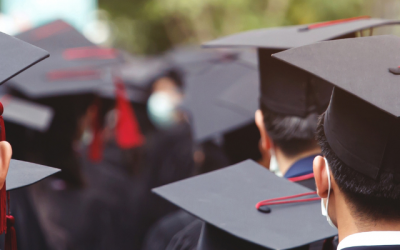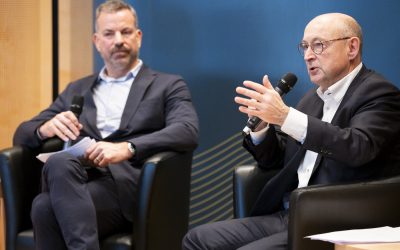"We think in terms of mobility needs and not national borders"
100 days in office: Transport Senator Ute Bonde in conversation
Interview: Sebastian Thomas | Head of Communication & Marketing
She is the youngest face in the Berlin Senate: Since the end of May, as Senator for Mobility, Transport, Climate Protection and the Environment, Ute Bonde has been shaping one of the city's most conflict-prone and at the same time particularly important policy areas. In times of tight budgets, the former VBB boss has to make the capital region's mobility system fit for the future - and not only take into account the interests of all transport users on both sides of the state border, but also promote climate targets. How is this to be achieved? We have asked.
Senator, the first question should come as no surprise to a transport senator: How did you get to work today?
Like every morning: with the S-Bahn.
When you took office at the end of May, you assumed political responsibility for the first time. What are your initial conclusions? Where have your expectations been confirmed, what has surprised you in your first steps on an unfamiliar stage?
Responsibility remains responsibility, regardless of the circumstances. So I do what I have always done: I approach issues openly and without prejudice, with a critical eye, seek advice, ask and question and then try to find the best solution for everyone. And, although I knew it would happen, I was a little surprised by the public interest in me.
Your proposals for new sources of public transport funding have met with little approval - not even from your own parliamentary group. This applies both to the company levy you mentioned and to higher parking charges. At the same time, your House is also having to tighten its belt in view of the difficult budgetary situation. How can public transport be made fit for the future under these circumstances?
Please allow me to set the record straight: These were not specific proposals for public transport funding. It was a suggestion to think outside the box. Not to adopt everything without comment, but as a suggestion to find and present your own ideas and solutions, perhaps outside the usual box.
"We must be open to new sources of funding for public transport"
Ute Bonde | Senator for Mobility, Transport, Climate Protection and the Environment
What role will public-private partnerships play?
In my view, we must also be open to new sources of funding for public transport. For me, however, the only thing that suits Berlin is something that, on the one hand, involves as little intervention as possible - both for citizens and companies - and, on the other hand, still enables very effective solutions.
Influential positions in Berlin's public transport system have just been filled: You are new in office, your successor as head of VBB has not yet been determined, and Henrik Falk has only been at the helm of BVG since the beginning of the year. More of a problem or more of an opportunity?
An opportunity. We are certainly united by the knowledge and years of experience of how important well-functioning public transport is for coexistence in a large city.
As a business representative, the VBKI thinks in terms of the Berlin-Brandenburg metropolitan region - in other words, across borders. Where do you see room for improvement in the area of transport and mobility in the cooperation between Berlin and Potsdam?
And here we are again, thinking outside the box. Yes, we too must and will work together with the state of Brandenburg, the VBB and the transport companies to adapt cross-border transport services to the needs of users. To this end, we are in good talks with the state of Brandenburg regarding a public transport cooperation agreement. We think in terms of mobility needs and not national borders. The better our services are, the more likely we are to convince people to use environmentally friendly buses and trains more often.
Is the maglev train an issue that could weld the two federal states together in their transport planning?
Quite conceivable. Because as far as the city center is concerned, we are doing really well in Berlin with our transport services. The situation is often different in the outlying districts and for connections to the surrounding areas. There is also enough space there for new lines. Maglev trains could therefore also be a practical alternative for commuters in the future. And, let's not forget: they can also be used to transport goods quickly, quietly and in an environmentally friendly way.
You want to persuade Berliners to leave their cars at home and use buses and trains instead by offering services rather than banning them. What three levers are you using to make local public transport so attractive that people can no longer ignore the calls?
Mobility is an important need for people and gives them the opportunity to live, work, learn and enjoy their leisure time in different locations, especially in our large metropolitan region. To achieve this, we need to further improve our already excellent public transport system and adapt it even better to the needs of our customers. Our joint i2030 project to improve the rail infrastructure in our region is an important building block in this regard. And, of course, this definitely includes good bus and train frequencies and the further expansion of streetcar, S-Bahn and U-Bahn lines, combined with a network of on-demand buses and good car-sharing services that still needs to be expanded, especially for the outer districts. Issues such as cleanliness and safety also play an important role in motivating people to make the switch.
"Maglev trains could therefore also be a practical alternative for commuters in the future"
Ute Bonde | Senator for Mobility, Transport, Climate Protection and the Environment
Demographic change does not stop at public transport. At the beginning of the year, BVG had to thin out its service - there were simply not enough staff available. Are driverless subway trains, such as those that have been in operation in Nuremberg for 15 years, an option for Berlin?
There will certainly be driverless subway trains in Berlin one day. But we must not forget that all previous examples of driverless transport have always involved the construction of new lines. The requirements for safe operation are therefore immense and involve huge construction and safety challenges. However, I think that a new line could also be an option worth considering for Berlin.
How can Berlin generally bring innovations into the transportation system more quickly?
I see the opportunity here in even closer links with innovations in science, technology and business. As with all issues relating to transportation in a metropolis like Berlin, it can only work together, in close and good cooperation. This is the only way we can ultimately make our city mobile, effective and always worth living in for future generations.
You are not only a transport senator, but also an environmental senator. Traditionally, the transport sector is considered particularly difficult to decarbonize. What contribution can the sector make to making Berlin climate-neutral by 2045?
It is precisely because the two topics of mobility and the environment require a close link that the decision to unite them under one roof is both right and important. Because only by working together, by understanding each other's common goals and by accepting each other's necessities, can and will we shape a future worth living for all of us in our city.
What other topics are at the top of the Berlin Environment and Climate Senator's agenda?
Working together. Just as mobility is an indispensable part of our city, our future and that of future generations depends on our actions to protect and systematically improve the environment. We can only do this well and properly if we work together and with respect. Only if we take a fair view of everyone's needs and act together rather than against each other will we be able to take the right path towards an environmentally friendly and liveable Berlin in the future.
Thank you very much for the interview!
You might also be interested in
More impact, less bureaucracy
VBKI discussion paper: Three proposals for a sustainable university landscape
"We don't have a knowledge problem, we have an implementation problem"
Business Breakfast: Vonovia CEO Rolf Buch as a guest at the VBKI
Experience politics up close
VBKI Young Professionals as guests at Bellevue Palace









